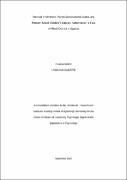| dc.contributor.author | Noirine, Khaitsa | |
| dc.date.accessioned | 2023-02-03T09:20:12Z | |
| dc.date.available | 2023-02-03T09:20:12Z | |
| dc.date.issued | 2022-09 | |
| dc.identifier.citation | Khaitsa, N. (2022) Parental involvement, parent socioeconomic status, and primary school children’s literacy achievement: a case of Mbale district in Uganda | en_US |
| dc.identifier.uri | https://hdl.handle.net/20.500.12504/1190 | |
| dc.description.abstract | The purpose of the study was to establish the relationship between parental
involvement, parent socioeconomic status, and primary school children’s literacy
achievement. The objectives of this study included; to assess the relationship between
parental involvement and primary school children’s literacy achievement; to examine the
relationship between parent socioeconomic status and primary school children’s literacy
achievement; to examine the relationship between parent socioeconomic status and parental
involvement; to examine the predictive potential of parental involvement and parent
socioeconomic status on primary school children’s literacy achievement and to establish the
mediating effect of parent socioeconomic status in the relationship between parental
involvement and primary school children’s literacy achievement. The researcher used a crosssectional
descriptive research design where both qualitative and quantitate approaches were
employed to analyze data. The main study consisted of 425 primary school pupils from
Mbale district. Data was analyzed using descriptive statistics, and cross tabulations. Pearson
correlation coefficient was utilized to derive an association among the study variables and
findings were presented in pie diagrams and bar graphs and frequency tables. A multiple
linear regression analysis to establish the prediction potential of parental involvement and
parent socioeconomic status on primary school children’s literacy achievement was
employed. Confirmation of mediation of Hypothesis five was done using Hayes process
model (Hayes, 2017). The study revealed that showed that a weak significant positive
relationship existed between parental involvement and primary school children’s literacy
achievement in Mbale district (r = .219, p≤0.01); a weak significant positive relationship
existed between parent socioeconomic status and primary school children’s literacy
achievement in Mbale district (r = .290, p≤0.01); a weak significant negative degree of
association existed between parent socioeconomic status and parental involvement in Mbale
district (r =-.158, p≤0.01). Results in the regression analysis revealed that a combination of
predictor variables parental involvement and parent socioeconomic status accounted for
15.1% (adjusted R square =.151) variation in primary school children’s literacy achievement.
Based on the findings, there’s need to improve primary children’s literacy achievement. This
can be done through schools and other development workers working together with
professional counselors to respectfully encourage parents and care givers to fully participate
in the education process of their children as well as supporting parents and caregivers to
improve their family socioeconomic status since it has been noted to affect a children’s
literacy achievement. | en_US |
| dc.language.iso | en | en_US |
| dc.publisher | Kyambogo University [unpublished work] | en_US |
| dc.subject | Parental involvement | en_US |
| dc.subject | Socioeconomic status | en_US |
| dc.subject | Primary school children | en_US |
| dc.subject | Literacy achievement | en_US |
| dc.subject | Mbale district | en_US |
| dc.subject | Uganda | en_US |
| dc.title | Parental involvement, parent socioeconomic status, and primary school children’s literacy achievement: a case of Mbale district in Uganda | en_US |
| dc.type | Thesis | en_US |

